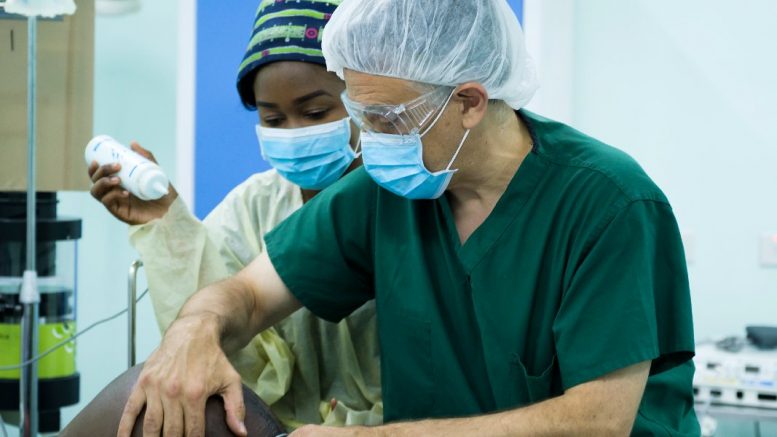Global Health Program Features A.I. Tool in One of the Most Under-Resourced Areas of the World
Texas Children’s Pavilion for Women announced today the launch of the PeriWatch Vigilance program in Lilongwe, Malawi (in southern Africa), in partnership with PeriGen Advanced Perinatal Software, a provider of innovative software solutions for over 20 years with a mission to protect mothers and babies everywhere. In a public-private partnership with the Texas Children’s Global Women’s Health Program, Baylor College of Medicine Children’s Foundation-Malawi, and Malawi Ministry of Health (Area 25), this artificial intelligence tool, which was supplied at no cost by PeriGen, provides one of the most sophisticated fetal monitoring systems to one of the most under-resourced areas of the world to help clinicians reduce stillbirths and neonatal mortality rates.
“In the U.S. alone, close to half of the unfavorable outcomes in childbirth are preventable and involve non-standard assessments of fetal monitor data, risks that PeriGen directly mitigates,” said Matthew Sappern, CEO of PeriGen. “But this is a universal challenge, without artificial borders of nation or region, and PeriGen and Texas Children’s demonstrate in Malawi that even the most advanced medical support can be delivered efficiently and effectively around the globe.”
PeriWatch Vigilance is an automated early warning system and clinical decision support tool, designed to enhance clinical efficiency, timely intervention, and standardization of care. The FDA-cleared system can track vital information for hundreds of patients at a time, across multiple hospital sites. Using artificial intelligence and other analytical techniques, it continuously monitors maternal vital signs, fetal heart rate, contractions, and labor progression, providing results graphically and with percentiles. Because of this continuous monitoring, PeriWatch Vigilance can detect abnormalities during labor and immediately notify clinicians.
As the Vice Chair of Global Women’s Health at Texas Children’s, Dr. Jeff Wilkinson discovered the harsh reality of maternal mortality, stillbirths, and early neonatal deaths in Malawi. For every 100,000 live births there are 400 maternal deaths and for every 50 births, Malawi loses 1 baby. In Texas, the mortality rate is much lower – 14 (white) and 27 (Black) women per 100,000 live births. At the Area 25 District Hospital in Malawi where the Texas Children’s team works in partnership with Ministry of Health, the annual number of deliveries is more than 7,000 per year, a similar volume of deliveries to that at Texas Children’s Pavilion for Women.
“The high mortality rate coupled with even higher birth rates meant that many of the newborns needed a high level of care that was historically unattainable,” said Wilkinson. “With the arrival of the PeriWatch Vigilance program, Malawi and Texas Children’s clinicians will be able to further enhance the level of care and safety provided to mothers and babies. We believe this groundbreaking technology, once foreign to sub-Saharan Africa, will help to reduce the number of Malawian babies that die during labor and delivery.”
Soon, clinicians will have the ability to access the maternal-fetal early warning system directly from all major devices including: desktops, tablets, and mobile phones. This “mobile solution” allows for Early Warning System notifications 24/7, unit oversight and consultation to each patient’s bedside team so clinicians can quickly review trends from hours of tracings and receive a consolidated overview at their fingertips.
“We’ve begun performing continuous PeriGen monitoring in collaboration with our Ministry of Health colleagues and on most of our patients in Malawi and have seen an incredible receptiveness of this new technology on the part of the obstetrics providers,” said Wilkinson. “Our leadership team of Drs. Ibe Iwuh and Chikhondi Chiweza and midwife Rachel Macleod have helped spearhead the project. We think the system has prevented some stillbirths and allowed us to intervene early to prevent birth asphyxia in some cases. Though the long-term trends remain to be seen, we are optimistic about the difference implementing this technology will make.”
In collaboration with the Global Women’s Health program and Baylor College of Medicine Children’s Foundation-Malawi, the Texas Children’s Information Services team overseeing the implementation of the PeriWatch Vigilance project worked to overcome many obstacles surrounding the implementation of this new technology, including network infrastructure and procuring the necessary workstations. They also worked within a complex security design to develop a solution that would allow for the secure transfer of data.
“The setup and implementation of PeriWatch in Malawi, the fourth poorest country in the World, has been smoother than expected,” added Dr. Wilkinson. “The uptake of the technology by our local maternity providers has been excellent. We have already seen results that strongly suggest a trend towards decreased stillbirth and neonatal death. We are thrilled to have the system up and running and plan to expand it to all of our labor rooms in the next two months, effectively covering all 7,000 births per year.”
“We are extremely proud of the dedication Dr. Wilkinson and our Global Health teams have displayed in bringing this initiative to fruition in partnership with PeriGen,” stated Dr. Michael Belfort, obstetrician and gynecologist-in-chief at Texas Children’s Pavilion for Women. “Our mission has always been to provide the best possible care and outcomes for mothers and babies, and extending that mission to low-resource areas of the world is an honor.”
For more information about PeriGen, visit the provider’s website at perigen.com. To learn more about the PeriWatch Vigilance® program, PeriGen has a number of resources on its webpage and in this video. To learn more about the Texas Children’s Global Women’s Health program, visit their webpage.

